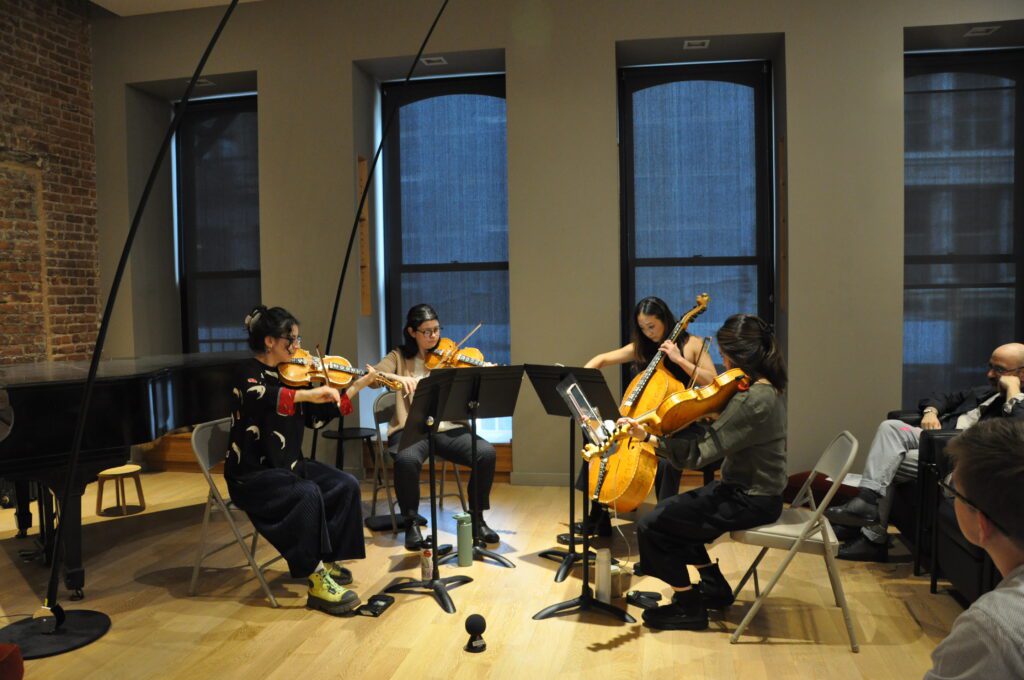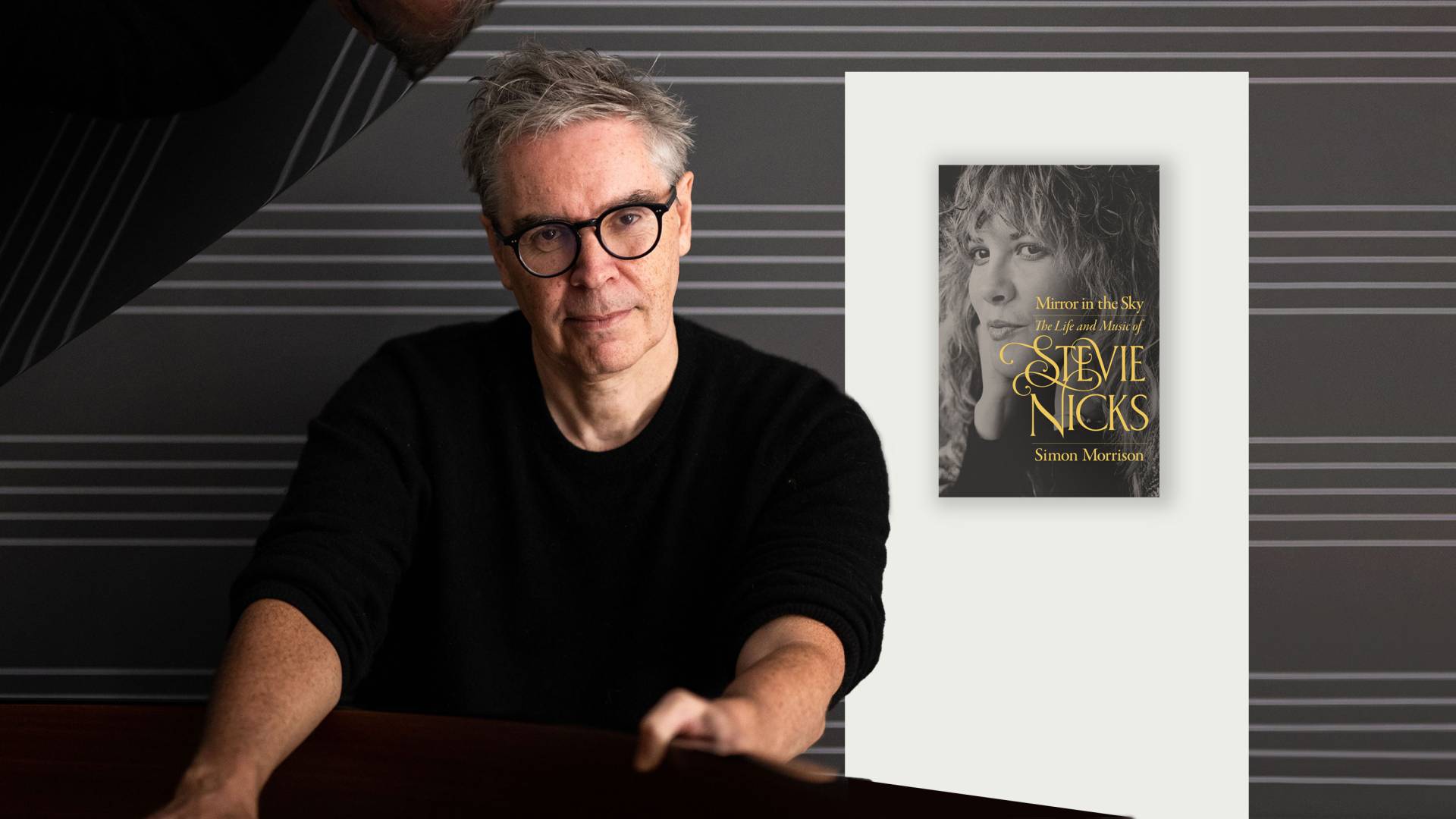Simon Morrison
Professor of Music
What’s on a musicologist’s desk? Simon Morrison, a cultural historian with expertise in Russia, the Soviet Union, modernism, and ballet, who’s been with the Music Department since the 1990s, invited us in for a peek into the method behind the musicology. The following responses were provided in November 2022.
Abstract expressionism, minus the expressionism. My office desk at the university is fairly playful, because I have a lot of drawings that my daughter did from when she was about three years old up to the present day. They go from abstract expressionism, I suppose without the expressionism, to drawings of her first plane ride to Los Angeles right up to her present day obsession with anime and manga and all things culturally Japanese. The plane ride one is really great: she draws a picture of herself on the plane, and all of the palm trees are drawn without a sense of proportion, so the fronds are all dangling down to the ground, and she says “the emotion I’m feeling is hope” because she really wanted to move to Los Angeles. I also love a picture that she drew of herself very happily, though it’s kind of melancholy in a way: it’s a picture of herself, by herself, having a tea party for herself. She’s pretty social, but early on, she liked to have these private spaces where she could just do her thing. So I think that’s really sweet and beautiful. A lot of her present-day drawings are all about teenage girl power; that’s what she’s all about, and so her father’s all about it, too.
Piecing together Tsar Alexei Mikhailovich. On the grimmer side, I also have a collection of documents related to one of the Russian tsars, Tsar Alexei Mikhailovich. I’m currently writing a history of violence, A.K.A. the history of Moscow, for Random House. The Tsar in question was more tolerable than other Russian tsars, but early on in his writings, in 1648, he put out a proclamation about morals and superstitions, and he went on the attack against minstrels [medieval musicians] in particular. He wrote that minstrels cause people to do bad things to one another: things like swinging on swings, not cleaning their houses or cleaning their houses using superstitious rituals, or bathing at night under the moonlight. Minstrels created – and this is an all time great phrase – “demonic divas who sing devilish songs.” And I was amazed by this because, later on, the same guy who was really hostile to all sorts of music making outside of chant in the church opened up this little theater for himself for private performances. The first ballet-like performance was done there, and a pseudo-operatic show! But the weird thing is that he was so afraid of music that he asked the dancers, “can you just do the ballet without any music?” They convinced him that they actually kind of needed that, so he said all right and, you know, covered up his ears. The “danger” of music is something that trails all the way through this period of time, and it’s really inscrutable.
Taking a cue from the students. I also have on my desk a stack of readings related to the current course I’m doing for undergraduates, which is MUS 238 on Romantic music. I said to the students midway through the semester, a lot of people are in this course because you really like the music and we only have 12 weeks together, so here’s the syllabus, and if there’s something you want added or changed, let me know. I put this on the midterm and I said, you get a bonus point for just answering the question. So some of them said, can you do Rachmaninoff? Which I added. And Swan Lake? Which is obvious enough. But I also wanted to add more female composers. So I altered the syllabus based on some of the suggestions that had more than one request, and then I also got really involved with a marvelous composer nobody knows, Cécile Chaminade. When we looked at Chaminade’s Méditation in precept, many of the students were like, I’m going to learn this. The music is gorgeous. Chaminade was a French composer who ended up in England and then in the United States, a piano-based composer, but she also wrote a ballet and an opera. And she had a little cult following with these Chaminade evenings. Now, tell me why we have Chopin and not Chaminade. There’s various reasons – not simply gender and misogyny. It has to do with itinerant existence, her father, and timing; she was later than Chopin, but the idiom was more beautiful and accessible than Chopin, frankly. I’ve been really digging into her stuff, and so on my desk there’s some of her music.
A gift for a “cat who walks their own way.” I also have a mug that was given to me by a colleague in England who described me as a “cat who walks their own way.” I’ve had a kind of strange career in musicology because I don’t do typical things. I do a lot of public writing, things like the Stevie Nicks book, which was kind of a challenge, a dare, I’d say from University of California Press. I’m less about the academy and conferences, people hashing out the date of a 14th-century motet. To me, that seems kind of counterintuitive. I also love ballet more than anything else. And I really harass the university to provide funding every year for the Princeton University Ballet. So I suppose doing ballet, doing popular music, writing for public media – it’s not typical. I could have just stuck with Prokofiev all my life. But this is a good way to keep learning and to keep challenging myself.
Where you bean? The other thing I have on my desk is a coffee stain from Wendy Heller, owing to the fact that the desk used to belong to her.
Join Simon Morrison in a discussion on his latest release, Mirror in the Sky: The Life and Music of Stevie Nicks, at Labyrinth Books November 10 at 6pm ET. You can also catch the livestream by clicking here.
In Other News

Resonant Revival: How a Norwegian Folk Fiddle Found a New Voice at Princeton
May 19, 2025
Dan Trueman, Chair of the Music Department, introduces Norwegian folk instruments to a new generation of composers and performers.

Elizabeth Margulis on the Frontiers of Music Cognition
Jan 22, 2025
The Department of Music is thrilled to congratulate musicology professor and Director of Graduate Studies Elizabeth Margulis, who has received the Ruth A. Solie Award for her editorial contributions to The Science-Music Borderlands: Reckoning with the Past and Imagining the Future.

Announcing the Launch of Princeton in Leipzig
Jan 7, 2025
Enrollment in “Princeton in Leipzig” has been extended to March 2, 2025! The Princeton Music Department is excited to announce the launch of Princeton in Leipzig, a summer study abroad …

